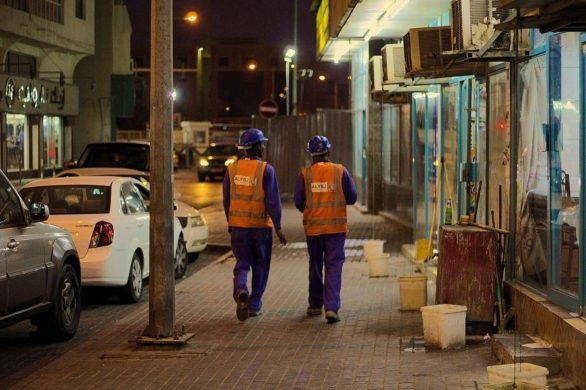
Qatar will face the International Labor Organization (ILO) tomorrow to defend itself against allegations of “forced labor.”
The ILO voted to investigate complaints filed by unions last year, and even visited Qatar to inspect working conditions for expats.
The complaint asserted that Qatar “fails to maintain a legal framework sufficient to protect the rights of migrant workers consistent with international law and to enforce the legal protections that currently do exist.”

It also lambasted Qatar’s former kafala sponsorship law, calling it “among the most restrictive in the Gulf region” because it makes it hard to leave an abusive employer.
The ILO had the option to recommend the establishment of a commission of inquiry, its highest investigative mechanism, to take a closer look at the complaints.
But last March, it decided to give Qatar a year to work on the issues, as the country was in the middle of changing its laws.
Kafala changes
Qatar officials submitted a document to the ILO last month, outlining its labor rights progress in recent years.
It highlighted several legislative changes, including Law №21 of 2015, which took effect in December.
Qatar called the legislation a “repeal of kafala.”

The new sponsorship law does indeed make it easier for expats to leave the country and change jobs.
But foreigners are still required to obtain exit permits from their employers.
And while it is now easier for some people to switch jobs, the no objection certificate requirement has not been abolished.
Instead, only workers on fixed-term contracts can now change jobs after their contract is completed without an NOC.
Those on open-ended contracts must work for five years before being able to do so. And all foreigners would need labor ministry approval before taking up new employment.
Domestic worker rights
The progress report also included information about a draft law on domestic workers, which Qatar’s Cabinet approved last month.
This legislation would provide legal protection to Qatar’s nannies, drivers and cooks by creating a common contract for them.

Currently, these workers are not required to sign contracts with their employers and cannot file complaints against them with the Ministry of Labor.
According to the document submitted to the ILO, the law would establish a 10-hour workday with periods for rest and food.
It would also mandate one day off a week. However, it is unclear how the law would be enforced, as inspectors are not usually sent to people’s homes to look for labor violations.
What’s next
Rights groups are closely watching this week’s session, and have urged the ILO not to close the complaint against Qatar.
Last week, Amnesty International urged that the process continues. James Lynch, Deputy Director of Amnesty’s Global Issues Program, said in a statement:
“This is a critical juncture for migrant workers in Qatar. The government has made some public commitments in response to ILO pressure, but its claims that it has abolished the sponsorship system simply do not add up.
If the ILO governing body endorses Qatar’s inadequate reforms by dropping this complaint, this could have damaging consequences for migrant rights in Qatar and across the region.”
Thoughts?






